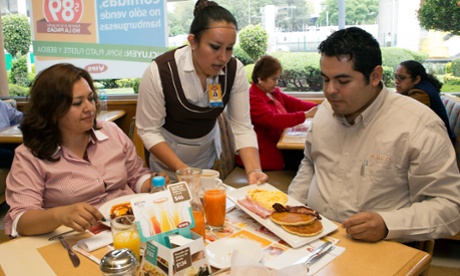
The decades-long trend for “unhealthy” foods to get cheaper while fruit and vegetables become more expensive is fuelling the global obesity crisis, according to the Overseas Development Institute (ODI) thinktank in London.
It says relative prices for fruit and veg in Brazil, China, Korea and Mexico soared by up to 91% between 1990 and 2012 while prices of some processed foods such as ready meals fell by up to 20% in the same period.
In the UK, the price of an ice cream halved between 1980 and 2012, while that of fresh veg tripled, said the ODI, which suggested that taxes on unhealthy foods matched by subsidies on healthier alternatives could reverse trends resulting in growing proportions of obese and overweight people.
Mexico has imposed taxes on junk food and the ODI said other countries would be closely watching whether this worked.
Its study, covering the four “newly rich” countries as well as the UK and the US, looked at staples such as cereals, root crops and legumes, fruit and veg, “minimally processed” meat, fish and dairy, vegetable oils and fats, animal fats and sugars, and industrially processed foods.
In Mexico, where seven in 10 adults are overweight or obese, ready meals had become cheaper as the cost of green veg rose, the report says. In Brazil, obesity soared as crisps, biscuits, energy bars and sugary drinks became more widely eaten.
In China, green vegetables became twice as expensive over two decades, and in Korea, the price of cabbage, used in many dishes including kimchi, rose by 20%.
Steve Wiggins, one of the report’s co-authors, said: “In Brazil, the consumption of ‘ultra-processed’ ready-to-eat food has risen from 80kg per person per year in 1990 to around 110kg per person per year by 2013. Using the weight of the food as a measure, this is equivalent to each person eating an extra 140 Big Macs a year”, he added.
The report says the rising cost of fruit and veg might be due in part to more produce being cut, trimmed, bagged and washed, and available all the year round.
Other advances in technology and cheaper transport and storage could explain the drop in prices of some processed foods such as noodles, ice creams, crisps and cookies.
Wiggins said: “Research in the UK in 2009 predicted that imposing a VAT-style 17.5% tax on less healthy food and using the proceeds to subsidise fruit and vegetables would save between 3,600 and 6,400 premature deaths a year from diet-related disease.
“Even the lower estimate (3,600) is more than twice as many as the amount of people that die on the roads in the UK and a huge effort is put into road safety.”
Previous attempts by countries to introduce taxes on unhealthy foods have proved controversial. Denmark quickly abandoned a 2011 fat tax after a change of government and Conservatives in the UK prefer to rely on voluntary agreements with the food industry to bring about dietary change.
But Wiggins said he did not believe other countries, including in South America, would be deterred by “cultural cringe” or a sense of inferiority to more industrialised states.
Last week, the World Health Organisation and the UK Health Forum told a conference in Prague that almost three-quarters of men and two-thirds of women in the UK would be overweight or obese in 15 years time, part of a Europe-wide health crisis that they said could only be averted by decisive action to prevent and tackle obesity by all its governments.
Other research presented to the same conference suggested that any move to introduce taxes on unhealthy foods in the UK and US would not be supported by most people.

